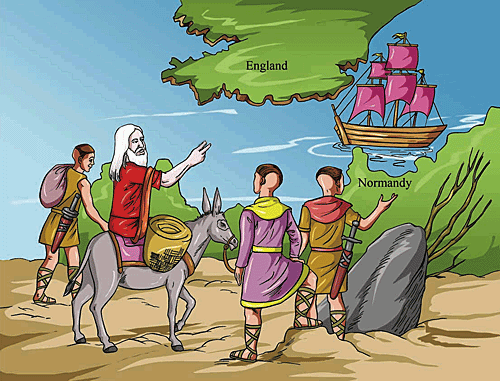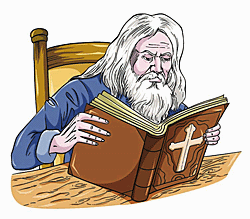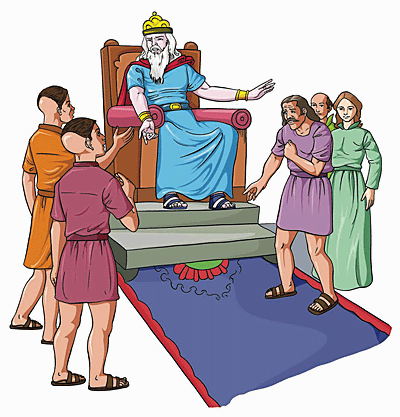English and Its Historical Development, Part 17
(Edward the Confessor restored King Alfred's linage)
In 1042-1066, the accession of Edward the Confessor to the throne of England restored King Alfred's line

The borrowing of Norman words started before 1066
The era of Danish influence on the English language reached its zenith during the reign of King Canute from 1017 to 1035, but with the accession of Edward the Confessor seven years after Canute's death, the linguistic climate started to undergo a change, limited at first but ultimately of profound importance to the national speech of English because Edward spoke French as his first language.
In 1002, the English King Æthelred married the daughter of the Duke of Normandy, Emma, and Edward was reared in Normandy, the maritime province which had been ceded by Charles the Simple of France in 912 to the Viking chieftain Ralf the Ganger; thereafter, Rollo, First Duke of Normandy.
Although in the beginning, Normandy (Nor-man-dy of "Northmen's Land") was simply another Danelaw imposed upon France, the Vikings who settled there adopted French customs and French speech so swiftly that two generations later, Rollo's grandson had to be sent from Rouen, the Norman capital, to Bayeux for tutoring in Danish because that was the only place in the entire dukedom where the Scandinavian tongue was still spoken.
In striking contrast with the linguistic evolution of England, no Scandinavian words survive in Normandy today; even in local dialect, except for a few place names.
Relations between England and Normandy were close for more than half a century before the Conquest
When Canute drove Æthelred the Unready into exile, the ousted English king took refuge in Rouen, because his wife Emma was a sister of Richard, the fourth Duke of Normandy, and grandfather of William the Conqueror.
Their son, Edward, was then only nine years old. When he was recalled to England in 1042 to assume the throne of his forebears, he was, at the age of 38, the finished product of French society and a French education.

With considerable resentment of the Anglo-Danish nobility, he proceeded to surround himself with Norman (French) advisers and Norman favorites, and he appointed Norman clergymen and nobles to important positions in the government and church hierarchy.
During the course of Edward's reign of 24 years, French became the dominant speech of important elements of the ruling classes. In many ways, he paved the way for that imminent and permanent Conquest which would change the political and social history of England and alter its language forever.
Edward was said to be a strange person both in appearance and behavior
He had white hair and a long white beard and a pinkish complexion which made him look almost albino in appearance.
His hands were long and thin and white to the point of transparency. He had a curious way of staring and he was given to sudden fits of unexplained speech and laughter.

Edward won his reputation for piety by spending hours each day at his religious devotions. After coming from his "devotions", however, he would go off on hunting orgies during which he slaughtered the poor beasts of the forest with bloodthirstiness.
When there was trouble in any part of the kingdom, it was Edward's first impulse to send troops with orders to burn and to slay; and only the influence of Harold Godwin kept him from acting on his bloody impulses.
After his death people compared the peacefulness of his reign with the terrible years which followed and began to think of him as a saint; a tendency strengthened by the claims that miracles took place at his tomb.
The blame for the terrible years, nearly two centuries of cruelty and oppression, can be laid squarely on the doorstep of this second unready King. Although married to Edytha, the beautiful daughter of Godwin, he showed no inclination to beget an heir.

In addition, he brought Normans over in droves and made bishops of them and earls and court stallers (standard bearers), and he gave lands and great wealth to them; and so created in Norman minds the belief that England was a rich plum for Norman plucking.
When William of Normandy paid Edward a visit, he promised that intensely ambitious man (or so William swore) the throne of England. If ascetic Edward made such a promise to Norman William, it could not be considered a valid claim because the monarchy was an office which the people conferred through the Witanagemot, the first ancestor of the modern Parliament.

When the thin hands of the weak old Edward had been folded on his chest and his body had been laid away in the great church he had built at Westminster (his one real personal achievement), the Witanagemot (council of citizens) faced a problem of whom to choose as their new king.
Proceed to Part 18, Norman invasion and conquest, 1066.
INDEX or Table of Contents, English and its historical development.
References: sources of information.
